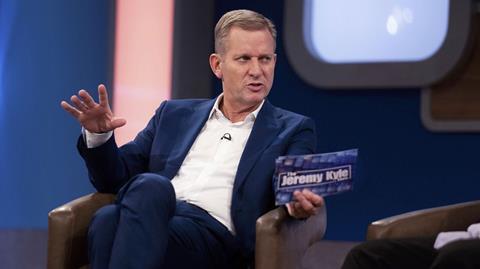Industry has to work tirelessly on its duty of care responsibilities

It is a sad truth that suicide is the biggest killer of men under 45 in the UK, and that cyber-bullying and trolling are symptoms of the modern age. These are societal problems, and to put the blame at the door of reality TV is wrong. But neither can the industry pass the buck.
TV can transform contributors’ lives for the better, but also significantly for the worse, and it feels as though that risk has become amplified far beyond the era when Big Brother or The X Factor were at their peak. It is surely no coincidence that the DCMS Committee is conducting inquiries into online safety and reality TV simultaneously.
It seems as though no one in the industry is shedding tears for the end of The Jeremy Kyle Show. While there is no joy at the unspecified number of job losses, the format felt at best hopelessly old fashioned and at worst purely exploitative. ITV made a mistake by airing it for so long.
When a show is based on conflict between its contributors, who were often among the most vulnerable in society, it is hard to envisage quite what duty of care looks like.
The Jeremy Kyle Show was at the back of the queue in terms of contemporary reality TV – completely unlike stablemate Love Island. The latter is now more lucrative for ITV than The X Factor was at its height, and its popularity means its contestants are under intense scrutiny.
“Catapulting people from obscurity to fame in the space of a few short weeks comes with a bigger responsibility than ever”
Late last year, ITV engaged Dr Paul Litchfield to review the show’s practices and medical procedures. Producers now provide social media and financial management training to participants, and their key focus is to be proactive in terms of post-TX duty of care, checking in with contributors on a regular basis rather than waiting to be asked for support.
In the dozens of conversations the Broadcast team has had on the subject with senior industry figures, no one has suggested ITV doesn’t take its Love Island duty of care seriously. Yet two contestants committed suicide after appearing on it.
Either those contributors were troubled prior to their appearances and this was not picked up during casting (it could have been actively concealed), or they encountered terrible problems after appearing on the show – though, of course, not necessarily because of it.

Mental health is too complex an issue to be reduced to simplistic cause and effect. But social media has exploded since reality TV emerged, and catapulting people from obscurity to fame in the space of a few short weeks comes with a bigger responsibility than ever.
The industry should be sharing best practice and challenging itself incessantly to ensure it does the right thing by contributors, and can hold its head high.
- Chris Curtis is the editor in chief of Broadcast





























No comments yet